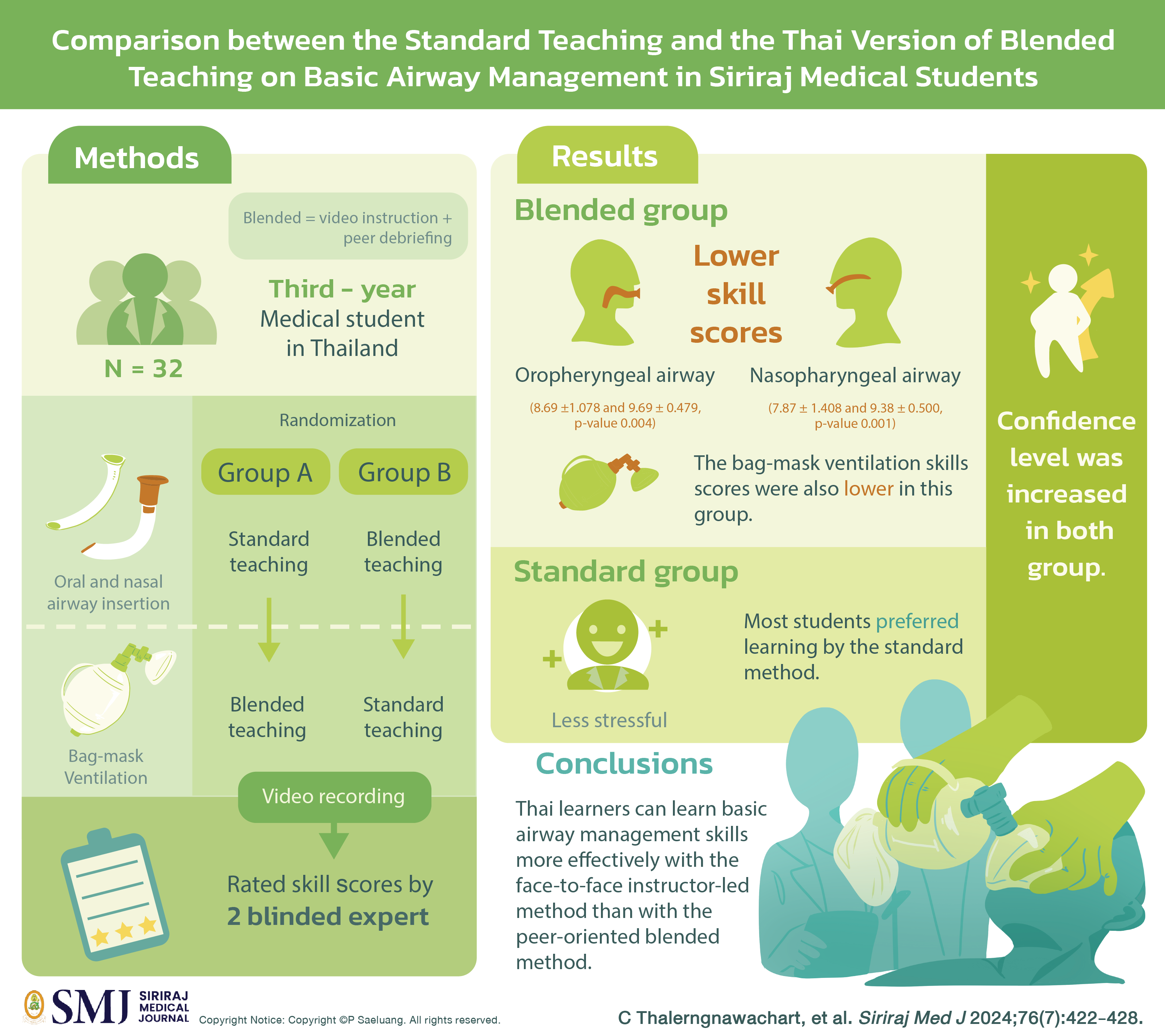Comparison between the Standard Teaching and the Thai Version of Blended Teaching on Basic Airway Management in Siriraj Medical Students
DOI:
https://doi.org/10.33192/smj.v76i7.266174Keywords:
basic airway management, self-instruction video, peer-to-peer debriefing, cultural diversityAbstract
Objective: To compare the basic airway management skill score of Thai medical students who learned airway management utilizing blended peer-to-peer teaching with those who learned by the standard face-to-face approach. The learners’ pre- and post-learning confidence, satisfaction with the learning, and stress levels were evaluated.
Materials and Methods: A randomized crossover study was conducted with third-year medical students in Thailand. Basic airway management was taught, including oropharyngeal and nasopharyngeal airway insertion, and bag-mask ventilation skills. After the learning, two blinded and independent experts rated the learners on performing the procedures.
Results: In total, 32 participants took part in the study. The blended group had significantly lower skill scores for oropharyngeal airway (8.69 ±1.078 and 9.69 ± 0.479, p-value 0.004) and nasopharyngeal airway (7.87 ± 1.408 and 9.38 ± 0.500, p-value 0.001) management, respectively. The bag-mask ventilation skills scores were also lower in the blended group. The confidence level was increased in both groups. Learning with the face-to-face method was found to be slightly less stressful. Overall, the majority of the students preferred learning by the standard method.
Conclusion: Unlike Western students, Thai learners can learn basic airway management skills more effectively with the face-to-face instructor-led method than with the peer-oriented blended method.
References
Surabenjawong U, Phrampus PE, Lutz J, Farkas D, Gopalakrishna A, Monsomboon A, et al. Comparison of Innovative Peer-to-Peer Education and Standard Instruction on Airway Management Skill Training. Clin Simul Nurs. 2020;47:16-24.
Limawongpranee S, Suwuttho S, Pittayawaranant B, Pittayawaranant S, Surinwont N. The effectiveness of using computer-assisted instruction (CAI) to support self-studying of the third-year Medical students taking the Medical Platyhelminthes course, Faculty of Medicine Siriraj Hospital, Mahidol University. Siriraj Med J. 2004;56(3):117-22.
Robinson JD, Persky AM. Developing Self-Directed Learners. Am J Pharm Educ 2020;84(3):847512.
Wijnen-Meijer M, Brandhuber T, Schneider A, Berberat PO. Implementing Kolb´s Experiential Learning Cycle by Linking Real Experience, Case-Based Discussion and Simulation. J Med Educ Curric Dev. 2022;9:23821205221091511.
Joy S, Kolb DA. Are there cultural differences in learning style? Int J Intercult Relat. 2009;33:69-85.
Parkhouse H, Lu CY, Massaro VR. Multicultural Education Professional Development: A Review of the Literature. Review of Educational Research. 2019;89(3):416-58.
Chayakonvikom M, Fuangvut P, Cannell S. Exploring Education Culture by Employing Hofstede’s Cultural Dimensions to Evaluate the Effectiveness of the Current ERP Training Approach in Thailand. J Educ Train Stud. 2016;4(10):78-89.
Choi H, Hwang W, Moon YE, Chae MS. Gender differences among medical students learning tracheal intubation: A prospective cohort study. Eur J Anaesthesiol. 2021;38(3):309-11.
Gaszynski T. A comparison of intubation performance between male and female medical students in a manikin model. Eur J Anaesthesiol. 2022;39(5):480-2.
McSwain NE, Pons PT. PHTLS: Pre-hospital trauma life support (8th ed). Burlington, MA: Jones & Bartlett Learning, (Chapter 8); 2016.
Sessoms J. Exploring the Culture Gap between Western Student-Centered Learning and Traditional Thai Education. Proceedings of 14th International Conference on Humanities and Social Sciences 2018 (IC-HUSO 2018) 22nd-23rd November 2018, Faculty of Humanities and Social Sciences, Khon Kaen University, Thailand.
Sarobol N. Implementing Cooperative Learning in English Language Classroom: Thai University Students’ Perceptions. The International Journal of Interdisciplinary Social Sciences. 2012;6(10):111-22.
Loeng S. Self-Directed Learning: A Core Concept in Adult Education. Hindawi Education Research International. 2020;3816132. https://doi.org/10.1155/2020/3816132
Leppink J, Kok EM, Bergman EM, van Loon MH, de Bruin AB. Four Common Pitfalls of Quantitative Analysis in Experimental Research. Acad Med. 2016;91(6):891.

Published
How to Cite
Issue
Section
Categories
License
Copyright (c) 2024 Siriraj Medical Journal

This work is licensed under a Creative Commons Attribution-NonCommercial-NoDerivatives 4.0 International License.
Authors who publish with this journal agree to the following conditions:
Copyright Transfer
In submitting a manuscript, the authors acknowledge that the work will become the copyrighted property of Siriraj Medical Journal upon publication.
License
Articles are licensed under a Creative Commons Attribution-NonCommercial-NoDerivatives 4.0 International License (CC BY-NC-ND 4.0). This license allows for the sharing of the work for non-commercial purposes with proper attribution to the authors and the journal. However, it does not permit modifications or the creation of derivative works.
Sharing and Access
Authors are encouraged to share their article on their personal or institutional websites and through other non-commercial platforms. Doing so can increase readership and citations.














